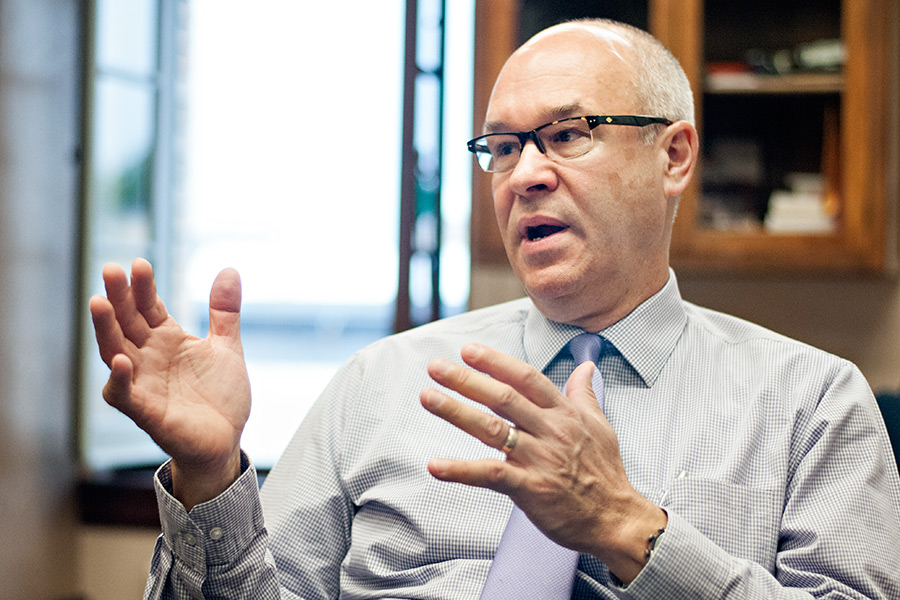As Gov. Steve Bullock pushes his proposal to publicly fund preschool, his budget request is sharpening a divide between advocates of state-funded early education and opponents who say the investment lacks merit.
Bullock’s proposal, dubbed Early Edge Montana, includes a $37 million item for a voluntary pre-kindergarten program for 4-year-olds. His plan would make $30,000 grants available to school districts for every 10 preschool-age students. The money for the initiative could be used by school districts to create preschool programs, partner with an existing one, or a combination of the two.
Under the proposal, participation would be voluntary for school districts and parents. The money would fund the program for two years and would be divided among the state’s school districts.
Bullock says that state-funded preschool aids in early childhood development and will improve performance in later education, and while school district leaders from across the state agree, the claim has been disputed by some state Republicans, including House Speaker Austin Knudsen.
Knudsen said the studies he’s read on preschool don’t show it as a worthy investment, and requested data proving that those who attend preschools later score higher on ACT tests.
Instead, many Republicans are pushing for publicly funded charter schools in Montana, as well as tax credits for private school scholarships, saying the measure would allow families more educational choices. School and education groups have lobbied against the measure, arguing that charter schools would funnel money away from traditional public schools. They also say tax credits for private school tuitions may be unconstitutional.
In the Flathead Valley, Mark Flatau, superintendent of Kalispell Public Schools District 5, recently joined a group of eight other school district leaders from across the state to support early education, saying students who attend preschool enjoy greater success in grade school and beyond.
He understands opponents’ argument against publicly funded early education but said he believes stakeholders could collaborate in their own communities to efficiently implement the measure.
“I think some folks can interpret it as another government entity trying to influence the minds of our young children. And I totally see that perspective. But from my perspective as an educator and knowing the challenges students face without that early-education foundation, the importance of those early learning years is key,” he said. “Unfortunately we are dealing with an increasing number of students who are coming to us without the level of skills and basic knowledge because they did not have that early-education experience. They are already at a disadvantage.”
The argument over early-education funding boils down to fundamental questions over how the state should educate its children and what role the government can play.
Montana remains one of only eight states without universal pre-kindergarten funding, and also one of only a handful of states without some kind of school choice program, a definition that includes charter schools, private school tax credits and vouchers.
Against that backdrop, the debate over school choice and early-education funding has ramped up in Montana as legislators once again grapple with the issue this session.
Early education advocates held a rally at the state Capitol in Helena on Jan. 23, when children and their families filled the lawn in support of Bullock’s Early Edge Montana program, encouraging lawmakers to adopt the measure during a House Appropriations committee of the Montana Legislature.
“It’s time we caught up with other states by investing in the future of our young people through this important initiative,” according to the letter by Missoula County Public Schools Superintendent Alex Apostle, which was co-signed by Flatau and superintendents from school districts in Billings, Great Falls, Helena, Bozeman, and Butte. “While ultimately, parents remain children’s first and best teachers, not all kids have parents with the time or resources to provide language-rich environments needed for healthy brain development, 90 percent of which occurs by age 5.”
But the Montana GOP has been resistant, saying the money would be better spent elsewhere on education, rather than on launching a new program.
Proponents counter that Early Edge Montana is a fiscally smart investment, pointing to studies showing that every dollar spent on early education yields $7 to $9 in savings down the road.
“Quality pre-K means students arrive at kindergarten ready to learn, more likely to read at grade level and to finish high school,” the letter states. “That translates into our schools being better able to shape responsible citizens who earn better wages, are less likely to find themselves in trouble with the law, and who contribute more to our tax base.”
Flatau said he’s seen firsthand the benefits of early education and how it provides a stronger foundation for students to be successful when they enter public schools, but that he also understands the perspective of opponents who say a publicly funded preschool program could be detrimental to private preschool providers by eroding their business.
To that end, Flatau has been in an ongoing conversation with local preschool providers to determine how best to provide early-education opportunities to a broader base of 4-year-old children while maintaining solvent businesses for the private preschool set.
“The last thing that we want to do is put any of our private preschools out of business. We are not going to let that happen,” he said. “But this could provide additional resources to our 4-year-olds whose families can’t afford preschool and we are going to work together to get those kids who are most needy into partial-day programs to prepare them and teach them the basic skills, so that when they begin their formal education they are already prepared and they are not going to fall behind.”
